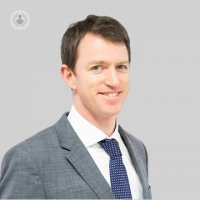Advancements in atrial fibrillation treatment
Escrito por:In his latest online article, Dr Malcolm Finlay gives us his insight into atrial fibrillation treatment. He talks about recent advancements, how effective modern treatment options are, if there are any innovative medications or therapies on the horizon, the role of technology and clinical trials or research findings relating to the contemporary management of atrial fibrillation.

What are the most recent advancements in minimally invasive procedures for treating atrial fibrillation?
Atrial fibrillation treatment has really undergone huge changes over the last few years. I think the biggest change from the patient point of view is the ease in which this can now be performed, and with it also safety. What are used to be a five- or six-hour procedure now can be completed within one hour. Even the more complex “redo” procedures rarely take longer than 2 hours in my practice. We have also seen big improvements in the technologies we use to perform ablation, and I’ve been very fortunate to be able to be able to have access to some of the very latest technologies for this both in the NHS and the Private Sector.
How effective are modern treatment options in maintaining a normal heart rhythm for individuals with atrial fibrillation?
Catheter ablation is now established as the most effective way of maintaining sinus rhythm for patients who have atrial fibrillation (AF). Our international guidelines have all been updated to reflect this, and certainly with people who have AF which comes and goes (paroxysmal AF) evidence evens suggest that ablation can be considered even before medical treatment has been tried. We know that over 85% of people who have paroxysmal AF will have a great long-term result after ablation treatment. If AF is there the whole time, around 75% of people can expect a similar result. However, it’s really important to note that these results often require 2 procedures in around 1/3 to ½ of patients. This is mainly because of healing of some of the treated areas, which can allow AF to come back.
Are there any innovative medications or therapies on the horizon for atrial fibrillation management?
There have been very exciting innovations in new therapies, particularly new ways of delivering ablation energy recently which look like they will improve the safety of the procedures further. I have been very fortunate to be involved in some developments in software to help guide our ablation treatments and I’m very hopeful that this will be highly impactful also. However, there haven’t been huge advances in medical treatment for AF over the last decade, on the contrary there has been a recognition of the importance of side effects. One further advance has been the appreciation of the importance of weight loss and avoidance of excess alcohol to help long-term results.
What role does cutting-edge technology, such as ablation techniques, play in modern atrial fibrillation treatment?
I would not be able to perform the procedures that I can without the very latest technologies that are now available. Cryoablation (the “freezing balloon”) has changed the way we can perform AF ablation, and the lessons we have learned from this also changed my practice with radiofrequency ablation. We now have a wider selection of tools which can give us more precise and standardised ablation, and also excellent feedback on the treatment we are performing. Ultimately, these make procedures safer, faster and more effective; and help to improve my patient’s experience and outcomes.
Can you discuss the latest clinical trials or research findings related to the contemporary management of atrial fibrillation?
AF ablation has been a commonly performed procedure over the last 10 years or so, we now have increasing evidence about how beneficial this can be particularly in patients with reduced heart pumping function. It is now very clear that in heart failure, aggressive treatment of AF with ablation improved heart function and can even actually lengthen patient’s lives. Unfortunately, to get the best results treatment needs to be performed fairly quickly. We also know that ablation is as safe or safer than most medical treatment for AF; and our unit has shown how important AF ablation can be. There are still some patients with AF who can be particularly challenging for ablation treatment, including those with hypertrophic cardiomyopathy, but I am very hopeful that the improvements in technology that we are seeing will provide us the tools to help treat even these challenging conditions more effectively.
Dr Malcolm Finlay is a distinguished cardiologist with over 20 years of experience. You can schedule an appointment with Dr Finlay on his Top Doctors profile.


